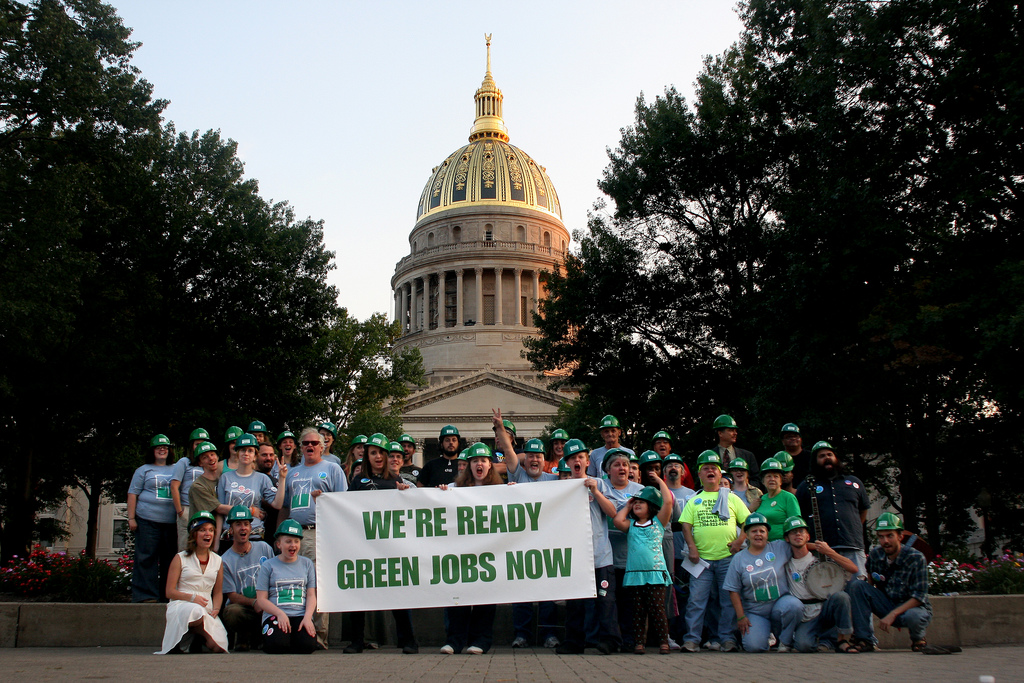What a week. President Obama delivered a major speech on climate change on Tuesday, directing the Environmental Protection Agency to carry out its obligations under existing law and limit carbon emissions from both new and existing power plants.
As a scientist studying climate change, I’m excited by the President’s leadership. He articulated the reality of the problem that we face, and why it’s so important that we act today to prepare for climate change that’s already locked in and protect future generations by cutting emissions.
Supporting mining communities
But as a son and brother of coal miners, I was disappointed that the President didn’t directly speak to the miners and their families who stand to lose the most from our nation’s (critically important) transition to clean sources of energy. However, a sentence near the end of the speech provides some cause for hope on that front:
We’re going to need to give special care to people and communities that are unsettled by this transition — not just here in the United States but around the world.
Senator Jay Rockefeller expressed my thoughts eloquently:
We need more from the President to assure our miners and working families they’re part of this plan. To begin with, we need to see a timeline, a cost estimate and to understand how communities that have relied on coal are going to be supported once these proposals take effect. I’m deeply concerned that, in its current form, there’s not enough emphasis in the President’s plan on the people who are the backbone of our economy and the fabric of our nation.
My work here at UCS suggests that West Virginians are concerned about coal jobs, but also very supportive of new economic development in their communities, including renewable energy like wind and solar.
Photo courtesy greenforall.org/flickr
Polling West Virginians
UCS commissioned a phone survey conducted by Lake Research Partners, which polled 407 likely voters in West Virginia from June 12-16, 2013. The survey found overwhelming support for using tax revenues from natural gas drilling and coal mining to support economic development projects and infrastructure. The topline results, including the exact wording of the questions, as well as the underlying cross tabs, are available. The poll had a margin of error of +/- 4.9%.
We asked two central questions. The first was related to the proposed Future Fund, which would use revenue from natural gas drilling to support economic development. The question read:
On another topic, oil and natural gas companies currently pay a tax of about 4.4% of the value of the oil and gas they extract in West Virginia. This money is used in West Virginia’s General Fund and Infrastructure Fund, and some of it is sent back to the counties where the resources came from. There is a proposal to use a portion of this money to create the “West Virginia Future Fund,” which would be designated solely for the purpose of economic development (split A: and infrastructure projects; split B: education, public safety, and land conservation projects), especially for oil and gas-producing counties and municipalities. Do you favor or oppose this proposal, or are you undecided?
Overall, 70% supported the proposal, 43% strongly. 12% were opposed (7% strongly) and 17% were undecided. The WV Legislature considered this proposal in the last session, but the bill didn’t make it out of committee.
The big surprise
Considering that companies in Wyoming pay a much higher tax rate on coal than do West Virginia companies, I was curious if that information would influence voters to change their opinions about how much the coal industry is taxed in our state. Interestingly, that information had no effect. But we found a much more interesting—stunning, actually—result. The question read:
Coal companies pay a tax of about 6.5% on the right to mine coal in West Virginia. There is a proposal to increase this tax by 1% and use the additional money for economic development projects, infrastructure projects, and education and worker training programs, especially in the West Virginia counties and municipalities where the coal is extracted. Do you favor or oppose this proposal, or are you undecided?
The results shocked even the pollsters. Fully 69% of voters supported the idea, 50% strongly so. 19% were opposed (11% strongly) and 11% were undecided. That’s no typo: voters in West Virginia support raising taxes on the coal industry by a whopping 50-percentage-point margin!
What’s more, the results held in all regions of the state, including the southern coalfields, where support actually reached 72%. Support was steady over party affiliation and was remarkably resilient to negative messages. In fact, people who either worked in the coal industry or have members of their households working in the industry showed slightly more support for the proposal (72% favor, 18% oppose).
Ready for a clean energy future
To me, this says that while voters worry about the future of coal mining jobs, they also want a stronger economy along with better environmental protections. This includes more opportunities to have good jobs in the communities they love. People get that change is coming, and they want to plan for the future to ensure a bright future for their kids and grandkids.
We did this polling to help inform a conversation we’re having in September. If you’d like to take part in it, you can join our upcoming event, A Bright Economic Future for the Mountain State, which will be held on September 3 and 4 at the Clay Center in Charleston.
Much more will be written in the coming weeks and months as this rich data set is analyzed. But it’s clear to me that West Virginians are ready to have a new conversation about the future of the state. And it makes me proud to be a Mountaineer.

